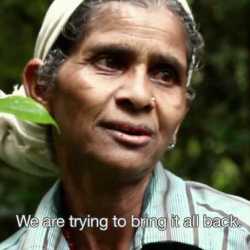Tribesmen’s freedom to enter the forest to collect herbal plants and other medicinal material should be protected by the law, Achappan Vaidyar, tribal healer from Wayanad, has said.
Speaking to The Hindu on the sidelines of a national-level tribal healers’ workshop and an exhibition of tribal medicines on the campus of the Kerala Institute for Research, Training and Development Studies of Scheduled Castes and Scheduled Tribes (Kirtads) here on Friday [preceding January 21, 2012], the octogenarian tribal healer said his community was finding it impossible to collect many inevitable medicinal ingredients as entry to the forest was restricted by authorities. Maintaining that they were not plunderers of forest, like many outsiders were, and wanted only a few inevitable medicinal plants to be collected from the woods, which they consider as their deity, the Vaidyar said centuries-old invaluable knowledge of tribal healing would be endangered if something was not done immediately in this direction. “Many of our men are persecuted for entering the forest to collect what they have been garnering from time immemorial,” he said adding that protecting the forest was their “responsibility and duty” more than anybody else’s.
The famed tribal healer, with a number of disciples spread across their tribe and with patients coming in search of him even from foreign countries, said that forest officials were not allowing their entry into the forest fearing that many of their (officials’) shady activities, including their furtive deals with tree fellers and forest looters, would come to light. “I know many cases of secret felling of trees that would cost lakhs of rupees from the very forest which the officials claim to be protecting,” said the veteran healer, who is also the chieftain and senior most member of the famous Ettillam family of the Kurichyar tribe at Palode in Mananthavady. […]
Observing that the ignorance of tribesmen was exploited by many people, he said the authorities should take measures to grant pension for tribal healers to enter the forest.
Source: “Forests beyond our reach: tribal healer” by Jabir Mushthari, The Hindu, January 21, 2012
Address : https://www.thehindu.com/todays-paper/tp-national/tp-kerala/article2819439.ece
Date Visited: 10 March 2021

Have you seen the arana? >>
“Tribal languages are a treasure trove of knowledge about a region’s flora, fauna and medicinal plants. Usually, this information is passed from generation to generation. However, when a language declines, that knowledge system is completely gone.” – Ayesha Kidwai (Centre for Linguistics, School of Language, Literature and Culture Studies, Jawaharlal Nehru University, New Delhi) quoted by Abhijit Mohanty in “Seven decades after independence, many tribal languages in India face extinction threat” | Learn more about the work done by the People’s Linguistic Survey of India and endangered languages worldwide >>
“The notion of ‘mainstreaming’ needs to be challenged not just because Adivasi culture is being crushed, but also because Adivasi values and ways of life offer insights that the ‘mainstream’ needs. If we are to halt the destruction of ecosystems, we need to understand how closely biodiversity and cultural diversity are intertwined. Perhaps it is time to reverse the gaze and begin to learn afresh from Adivasis.” – Felix Padel & Malvika Gupta (The Hindu) | Learn more about the role of tribal communities in fostering biodiversity, ethnobotany and cultural diversity | Success stories | Tribal identity >>
“I think that by retaining one’s childhood love of such things as trees, fishes, butterflies and … toads, one makes a peaceful and decent future a little more probable, and that by preaching the doctrine that nothing is to be admired except steel and concrete, one merely makes it a little surer that human beings will have no outlet for their surplus energy except in hatred and leader worship.” – George Orwell | Learn more: Childhood | Customs | Games and leisure time | Literature – fiction | Storytelling >>
“The theoretical debate on caste among social scientists has receded into the background in recent years. [C]aste is in no sense disappearing: indeed, the present wave of neo-liberal policies in India, with privatisation of enterprises and education, has strengthened the importance of caste ties, as selection to posts and educational institutions is less based on merit through examinations, and increasingly on social contact as also on corruption.” – Harald Tambs-Lyche (Professor Emeritus, Université de Picardie, Amiens) in “Caste: History and the Present” (Academia Letters) | Learn more: Accountability | Democracy | Education and literacy >>
View Tribal Cultural Heritage in India Foundation in a larger map